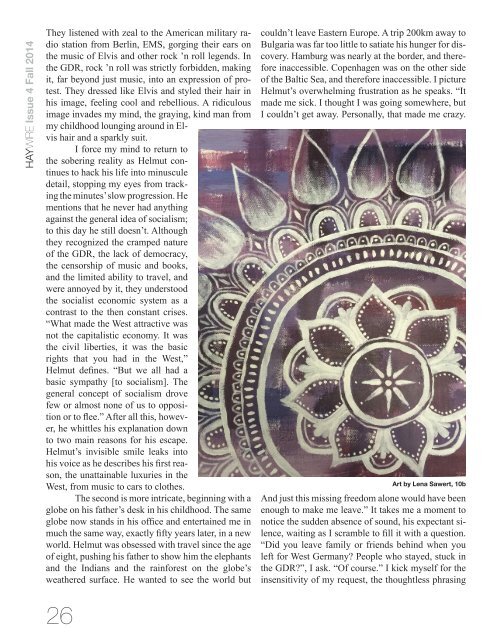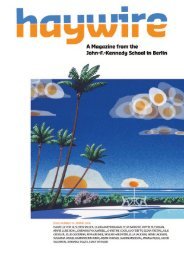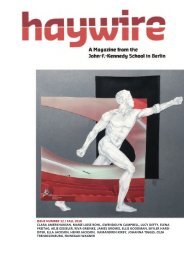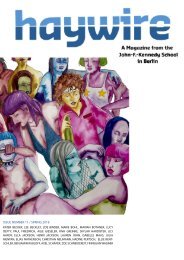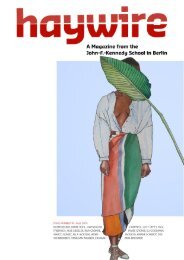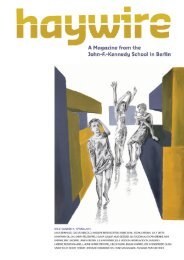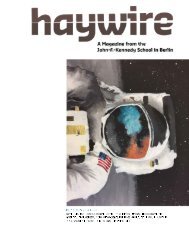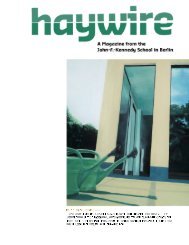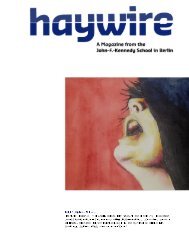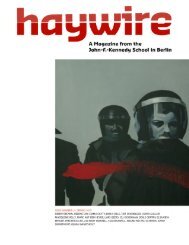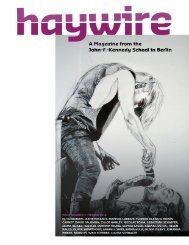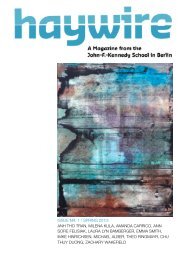Haywire Issue 4 Fall 2014
- No tags were found...
Create successful ePaper yourself
Turn your PDF publications into a flip-book with our unique Google optimized e-Paper software.
HAYWIRE <strong>Issue</strong> 4 <strong>Fall</strong> <strong>2014</strong><br />
They listened with zeal to the American military radio<br />
station from Berlin, EMS, gorging their ears on<br />
the music of Elvis and other rock ’n roll legends. In<br />
the GDR, rock ’n roll was strictly forbidden, making<br />
it, far beyond just music, into an expression of protest.<br />
They dressed like Elvis and styled their hair in<br />
his image, feeling cool and rebellious. A ridiculous<br />
image invades my mind, the graying, kind man from<br />
my childhood lounging around in Elvis<br />
hair and a sparkly suit.<br />
I force my mind to return to<br />
the sobering reality as Helmut continues<br />
to hack his life into minuscule<br />
detail, stopping my eyes from tracking<br />
the minutes’ slow progression. He<br />
mentions that he never had anything<br />
against the general idea of socialism;<br />
to this day he still doesn’t. Although<br />
they recognized the cramped nature<br />
of the GDR, the lack of democracy,<br />
the censorship of music and books,<br />
and the limited ability to travel, and<br />
were annoyed by it, they understood<br />
the socialist economic system as a<br />
contrast to the then constant crises.<br />
“What made the West attractive was<br />
not the capitalistic economy. It was<br />
the civil liberties, it was the basic<br />
rights that you had in the West,”<br />
Helmut defines. “But we all had a<br />
basic sympathy [to socialism]. The<br />
general concept of socialism drove<br />
few or almost none of us to opposition<br />
or to flee.” After all this, however,<br />
he whittles his explanation down<br />
to two main reasons for his escape.<br />
Helmut’s invisible smile leaks into<br />
his voice as he describes his first reason,<br />
the unattainable luxuries in the<br />
West, from music to cars to clothes.<br />
The second is more intricate, beginning with a<br />
globe on his father’s desk in his childhood. The same<br />
globe now stands in his office and entertained me in<br />
much the same way, exactly fifty years later, in a new<br />
world. Helmut was obsessed with travel since the age<br />
of eight, pushing his father to show him the elephants<br />
and the Indians and the rainforest on the globe’s<br />
weathered surface. He wanted to see the world but<br />
couldn’t leave Eastern Europe. A trip 200km away to<br />
Bulgaria was far too little to satiate his hunger for discovery.<br />
Hamburg was nearly at the border, and therefore<br />
inaccessible. Copenhagen was on the other side<br />
of the Baltic Sea, and therefore inaccessible. I picture<br />
Helmut’s overwhelming frustration as he speaks. “It<br />
made me sick. I thought I was going somewhere, but<br />
I couldn’t get away. Personally, that made me crazy.<br />
Art by Lena Sawert, 10b<br />
And just this missing freedom alone would have been<br />
enough to make me leave.” It takes me a moment to<br />
notice the sudden absence of sound, his expectant silence,<br />
waiting as I scramble to fill it with a question.<br />
“Did you leave family or friends behind when you<br />
left for West Germany People who stayed, stuck in<br />
the GDR”, I ask. “Of course.” I kick myself for the<br />
insensitivity of my request, the thoughtless phrasing<br />
26


